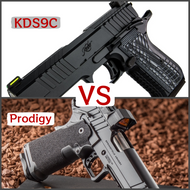Comparing the Kimber KDS9C and Springfield Prodigy: Which Compact Pistol Reigns Supreme?
Posted by Eagle Armorment on Aug 13th 2024
When it comes to compact pistols, there are certainly no shortage of options on the market. Two popular contenders in this category are the Kimber KDS9C and the Springfield Prodigy. Both firearms offer power and versatility in a smaller, more easily concealable package. But which one comes out on top?
In this article, we'll compare the Kimber KDS9C and the Springfield Prodigy to determine which compact pistol reigns supreme. We'll delve into their design, features, performance, and more to give you an in-depth analysis of each firearm. Whether you're a seasoned gun enthusiast or a first-time buyer, this comprehensive comparison will help you make an informed decision.
The Kimber KDS9C boasts a reputation for its sleek and ergonomic design, while the Springfield Prodigy is known for its reliability and precision. Both pistols have their own set of loyal followers, each praising the unique attributes of their favorite firearm.
Join us as we evaluate these compact pistols head-to-head and discover which one emerges as the ultimate choice for concealed carry, home defense, and beyond. It's time to find out if the Kimber KDS9C or the Springfield Prodigy will earn the title of champion in the world of compact pistols.
Features and specifications of the Kimber KDS9C
The Kimber KDS9C is a compact 9mm pistol that has been designed with both performance and concealment in mind. One of the standout features of this firearm is its lightweight construction, weighing in at just 25 ounces unloaded. This makes it an ideal choice for those seeking a concealed carry option that won't weigh them down.
The KDS9C features a 3-inch barrel, which provides a balance between portability and ballistic performance. The barrel is made from high-quality stainless steel, ensuring durability and corrosion resistance. The pistol also boasts an overall length of just 6.8 inches, further enhancing its compact and easy-to-carry nature.
In terms of capacity, the Kimber KDS9C comes with a 7-round magazine, providing a respectable number of rounds while still maintaining a smaller profile. The magazine is made from durable polymer, adding to the overall lightweight design of the firearm. The pistol also features Kimber's renowned match-grade trigger, which is known for its smooth and consistent pull, contributing to improved accuracy and control.
Performance and reliability of the Kimber KDS9C
When it comes to performance, the Kimber KDS9C has consistently proven itself to be a reliable and accurate compact pistol. The combination of its lightweight construction, high-quality components, and precision engineering results in a firearm that is well-suited for a variety of applications, from concealed carry to target shooting.
One of the key factors contributing to the KDS9C's performance is its recoil management. Despite its compact size, the pistol's design and weight distribution help to mitigate the felt recoil, allowing for faster follow-up shots and more accurate target engagement. This makes the KDS9C a popular choice among shooters who value control and maneuverability in a self-defense or competitive setting.
In terms of reliability, the Kimber KDS9C has earned a reputation for its consistent and dependable operation. The firearm is known to function reliably with a wide range of ammunition, from standard ball ammunition to hollow-point self-defense rounds. This reliability is further enhanced by the pistol's robust construction and attention to detail in the manufacturing process.
Pros and cons of the Kimber KDS9C
Pros:
- Lightweight and compact design for easy concealment and carry
- Accurate and reliable performance with a smooth, match-grade trigger
- Durable stainless steel construction and corrosion-resistant finish
- Respectable 7-round magazine capacity for a compact pistol
- Reputation for consistent and dependable operation with various ammunition types
Cons:
- Relatively high price point compared to some other compact 9mm pistols
- Limited customization options compared to some other platforms
- Smaller grip size may not be suitable for shooters with larger hands
- Potential for increased muzzle rise and recoil due to the compact size and lightweight design
Overall, the Kimber KDS9C offers a compelling combination of performance, reliability, and portability that has made it a popular choice among concealed carry enthusiasts and self-defense shooters. Its high-quality construction and attention to detail are hallmarks of the Kimber brand, but the higher price point may be a consideration for some buyers.
Features and specifications of the Springfield Prodigy
The Springfield Prodigy is a compact 9mm pistol that has been designed with a focus on both performance and ergonomics. One of the standout features of this firearm is its full-size grip, which provides a more comfortable and secure hold for shooters, even those with larger hands.
Despite its compact size, the Prodigy boasts a 3.6-inch barrel, offering a balance between portability and ballistic performance. The barrel is made from high-quality stainless steel, ensuring durability and corrosion resistance. The overall length of the pistol is 6.6 inches, making it slightly longer than the Kimber KDS9C but still well-suited for concealed carry.
In terms of capacity, the Springfield Prodigy comes with a 10-round magazine, providing a higher round count compared to the Kimber KDS9C. The magazine is made from durable polymer, contributing to the overall lightweight design of the firearm. The Prodigy also features a crisp and consistent trigger, which is known for its smooth and predictable pull, enhancing accuracy and control.
Performance and reliability of the Springfield Prodigy
The Springfield Prodigy has consistently demonstrated impressive performance and reliability in various shooting scenarios. The combination of its ergonomic design, high-quality components, and precision engineering results in a compact pistol that is well-suited for both self-defense and target shooting applications.
One of the key factors contributing to the Prodigy's performance is its recoil management. Despite its compact size, the pistol's weight distribution and design features help to mitigate the felt recoil, allowing for faster follow-up shots and more accurate target engagement. This makes the Prodigy a popular choice among shooters who prioritize control and confidence in their compact pistol.
In terms of reliability, the Springfield Prodigy has earned a reputation for its consistent and dependable operation. The firearm is known to function reliably with a wide range of ammunition, from standard ball ammunition to high-performance hollow-point self-defense rounds. This reliability is further enhanced by the pistol's robust construction and attention to detail in the manufacturing process.
Pros and cons of the Springfield Prodigy
Pros:
- Ergonomic full-size grip design for improved comfort and control
- Accurate and reliable performance with a crisp, consistent trigger
- Durable stainless steel construction and corrosion-resistant finish
- Higher 10-round magazine capacity compared to the Kimber KDS9C
- Reputation for consistent and dependable operation with various ammunition types
Cons:
- Slightly larger and heavier than some other compact 9mm pistols
- May not be as easily concealable as the Kimber KDS9C due to its slightly larger size
- Limited customization options compared to some other platforms
- Potential for increased muzzle rise and recoil due to the compact size and weight
Overall, the Springfield Prodigy offers a compelling combination of performance, reliability, and ergonomics that has made it a popular choice among self-defense and concealed carry enthusiasts. Its full-size grip and higher magazine capacity may appeal to shooters who prioritize comfort and capacity, but the slightly larger size may be a consideration for those seeking the most discreet concealed carry option.
A comparison of the Kimber KDS9C and Springfield Prodigy
When comparing the Kimber KDS9C and the Springfield Prodigy, there are several key factors to consider:
Design and Ergonomics:
The Kimber KDS9C boasts a more compact and lightweight design, weighing in at just 25 ounces unloaded. This makes it an excellent choice for concealed carry, as it can be easily hidden and won't weigh the user down. In contrast, the Springfield Prodigy features a full-size grip, which provides a more comfortable and secure hold, particularly for shooters with larger hands.
Capacity and Dimensions:
The Kimber KDS9C comes with a 7-round magazine, while the Springfield Prodigy offers a higher 10-round capacity. However, the Kimber KDS9C is slightly smaller in overall length, measuring 6.8 inches compared to the Prodigy's 6.6 inches. This difference in size may be a factor for those seeking the most compact and discreet carry option.
Trigger and Accuracy:
Both the Kimber KDS9C and the Springfield Prodigy are known for their smooth and consistent triggers, which contribute to improved accuracy and control. The Kimber's match-grade trigger is particularly praised for its precision, while the Prodigy's crisp and predictable pull also offers excellent performance.
Reliability and Performance:
Both pistols have earned reputations for their reliable and consistent operation, functioning well with a variety of ammunition types. The Kimber KDS9C's lightweight design and recoil management may give it a slight edge in terms of control and follow-up shots, while the Prodigy's larger grip and higher capacity may appeal to shooters who prioritize those features.
Price and Availability:
The Kimber KDS9C generally carries a higher price tag compared to the Springfield Prodigy, reflecting the brand's reputation for quality and attention to detail. Both pistols are widely available from various retailers and online outlets, but the Prodigy may be slightly more accessible for some buyers.
Ultimately, the choice between the Kimber KDS9C and the Springfield Prodigy will come down to the individual shooter's priorities and personal preferences. Both compact pistols offer impressive performance and reliability, but their unique design features and attributes may appeal to different types of users.
Factors to consider when choosing a compact pistol
When selecting a compact pistol, there are several key factors to consider to ensure you choose the right firearm for your needs:
Intended Use:
Determine the primary purpose of the compact pistol, whether it's for concealed carry, home defense, target shooting, or a combination of these applications. This will help guide your decision-making process and prioritize the features that are most important to you.
Comfort and Ergonomics:
Consider the size, weight, and grip design of the compact pistol. A comfortable and ergonomic grip can make a significant difference in your ability to control the firearm and shoot accurately, especially in high-stress situations.
Capacity and Caliber:
Decide on the appropriate magazine capacity and caliber that meets your needs. Compact pistols are often chambered in 9mm, but other options like .380 ACP or .45 ACP may also be available. Weigh the tradeoffs between capacity, recoil, and overall size and weight.
Reliability and Performance:
Evaluate the reputation of the firearm manufacturer and research reviews on the reliability and performance of the compact pistol under consideration. Consistent and dependable operation is crucial, especially for self-defense or carry purposes.
Customization and Accessories:
Determine if the compact pistol offers the ability to customize or add accessories, such as sights, holsters, or lights. This can enhance the firearm's functionality and personalize it to your preferences.
Budget and Availability:
Consider your budget and the overall cost of the compact pistol, including any necessary accessories or modifications. Additionally, assess the availability of the firearm in your local area or through online retailers.
By carefully considering these factors, you can make an informed decision and select the compact pistol that best suits your needs and preferences, whether it's the Kimber KDS9C, the Springfield Prodigy, or another model entirely.
Conclusion: Which compact pistol is right for you?
In the end, the decision between the Kimber KDS9C and the Springfield Prodigy will come down to your individual needs, preferences, and priorities. Both compact pistols offer impressive performance, reliability, and attention to detail, making them compelling choices in the crowded market of concealed carry and self-defense firearms.
If you prioritize a lightweight and highly concealable design, the Kimber KDS9C may be the better fit. Its compact size and 25-ounce unloaded weight make it an excellent option for those who value discreet carry and easy maneuverability. The Kimber's match-grade trigger and recoil management also contribute to its accuracy and control.
On the other hand, if you prefer a more ergonomic grip and a higher magazine capacity, the Springfield Prodigy may be the better choice. The full-size grip design provides a more comfortable and secure hold, particularly for shooters with larger hands. The Prodigy's 10-round magazine capacity also offers an advantage in terms of firepower and capacity.
Ultimately, the "best" compact pistol is the one that meets your specific needs and preferences. Both the Kimber KDS9C and the Springfield Prodigy are well-engineered and highly capable firearms that have earned the trust of many shooters. Carefully evaluate your requirements, try out both models if possible, and make the decision that aligns with your personal needs and shooting style.
Regardless of which compact pistol you choose, you can rest assured that you'll be investing in a reliable and high-performing firearm that can serve you well for years to come, whether for concealed carry, home defense, or recreational shooting.



